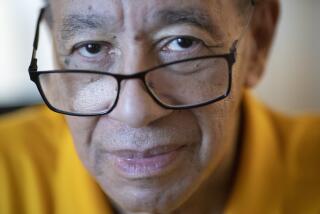Chronic Illness Found to Impoverish Aged : Congress Studies Cite Medicaid Rules, Cost of Long-Term Care
- Share via
WASHINGTON — About half of the nation’s elderly who now live alone would spend themselves into poverty within a few months after entering a nursing home because of chronic illness, two new surveys suggest.
The studies show that Congress faces an “unfinished agenda” in its attempt to provide essential health care to the poor, disabled and elderly, according to Rep. Edward R. Roybal (D-Los Angeles), chairman of the House Select Committee on Aging.
The surveys, sponsored by the committee, are scheduled to be released today, 20 years after President Lyndon B. Johnson signed the Medicare and Medicaid programs into law. But the anniversary, Roybal said in a statement, is “only a bittersweet occasion. We would be irresponsible if we failed to recognize the health and financial risks facing America’s aged and poor--particularly with respect to long-term care.”
Central to the problem, he charged, is that, although Medicare and most private health insurance programs cover the costs of acute illness, they provide scant coverage for long-term debilitating illnesses such as Alzheimer’s disease, which afflicts more than 2 million Americans and often requires prolonged, costly stays in nursing homes and other institutions.
Soon to Be Worse Off
Moreover, soon the elderly will be even worse off, according to a separate committee study that projects that they will be spending 18.9% of their income--an average of $2,583 a person--on health care by 1990. That represents a sharp increase from the 14.6% spent in 1984--a result, the study said, of the fact that health care costs are rising twice as fast as the incomes of the aged.
The collaborative surveys, conducted in Massachusetts by Harvard Medical School and the Blue Cross/Blue Shield insurance company, suggest that chronic illness forces the elderly to pay out of their own pockets for much of their health care until they become poor enough to qualify for Medicaid.
Medicaid provides coverage for stays in nursing homes--but only after the elderly “spend down” to the poverty level, depleting most of their assets.
However, “the time between financial independence and impoverishment is alarmingly short,” Roybal wrote. “For the Alzheimer’s victim, and for the spouse who must remain in the community in an impoverished state, the emotional and financial consequences of ‘spend down’ can be tragic.”
For the purpose of the Massachusetts analysis, an elderly person was considered eligible for Medicaid only after liquid assets had dwindled to $1,000 and annual income had been spent down to $4,000. In keeping with Medicaid eligibility guidelines, non-liquid assets such as houses were not included. Health care fees were estimated at $75 a day, the rate charged most frequently in skilled nursing homes.
Of those at least 75 years old who live alone, 7% were judged to be impoverished--but that number would have soared to 46% after 13 weeks of nursing home care, the Harvard study found. After a year in an institution, only one in four would remain out of poverty.
In the Blue Cross sample of slightly younger patients, ages 66 and over, the risk was judged even greater: 63% would have been at the poverty level by the 13th week of institutionalization.
Standards for Medicaid eligibility vary slightly from state to state, but a spokesman for the committee said that the Massachusetts findings could be considered roughly representative of the situation nationwide.
More to Read
Sign up for Essential California
The most important California stories and recommendations in your inbox every morning.
You may occasionally receive promotional content from the Los Angeles Times.













